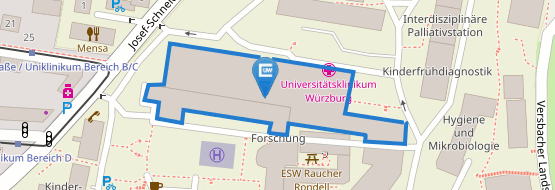Speed control on the DNA
11/17/2020The protein complex TFIIH is responsible for essential cellular functions such as transcription or DNA repair. These processes must be carried out with extreme precision in order to prevent serious diseases, such as cancer. The enzyme XPB is part of the TFIIH complex and is indispensable for both processes. How XPB is simultaneously activated and repressed by its interaction partners p8/p52 within the TFIIH complex has now been demonstrated by a Würzburg research group. The results improve the functional understanding of this intricate complex and were published in the journal Nucleic Acids Research.

DNA damage that needs to be repaired and genes that need to be transcribed: the enzyme XPB, which is part of the TFIIH complex, is essential for both processes. The importance of a proper functioning XPB is demonstrated by the fact that a malfunction of this enzyme can lead to severe clinical disorders such as Xeroderma Pigmentosum and Trichothiodystrophy.
The research group of Prof. Caroline Kisker from the Rudolf Virchow Center for Integrative and Translational Bioimaging at the University of Würzburg could now show that the TFIIH subunits p52/p8 control the functionality of the enzyme XPB by both activating it and ensuring that it does not proceed too fast. These results improve the understanding of the protein complex TFIIH and its important functions.
Fine tuning of XPB speed
During transcription, XPB binds to the DNA double helix, migrates along it and causes a separation of the two strands so that the genes can be read. To activate the enzyme, the two subunits of XPB (pink and red in the image) must be brought into close spatial proximity to each other. This activation is achieved by p8/p52 binding to XPB or, to an even greater extent, by DNA binding. "If both activating factors are bound simultaneously, one would actually assume that the stronger activation prevails, but the opposite is the case," says Dr. Jochen Kuper, who is a postdoctoral researcher in the group. "With our structural and functional analysis we were able to show that p52/p8 restricts the mobility of the enzymatic subunits of XPB. P52/p8 acts like a brake shoe and slows down the speed of XPB," explains Kisker. This ensures that XPB works according to the cellular needs because precise regulation of the enzyme is essential during transcription and DNA repair. In the work presented, the research group has now identified p52/p8 as the master regulators of XPB. "Our results also explain why a mutation in such a tiny subunit like p8 can lead to such severe consequences like the disease Trichothiodystrophy," said Jeannette Kappenberger, PhD student in the Kisker group and first author of the study.
The scientists are now planning further structural and functional investigations of the proteins. They also want to find out how the complex can be specifically targeted by inhibitors.
Publication
Kappenberger J., Koelmel W., Schoenwetter E., Scheuer T., Woerner, J., Kuper J., Kisker C. How to limit the speed of a motor: The intricate regulation of the XPB ATPase and Translocase in TFIIH Nucleic Acids Research (November 2020) doi: 10.1093/nar/gkaa911
Persons
Jeannette Kappenberger (PhD student) is a researcher in Prof. Dr. Caroline Kisker's group at the Rudolf Virchow Center for Integrative and Translational Bioimaging at the University of Würzburg.
Dr. Jochen Kuper (Postdoc) is a researcher in Prof. Dr. Caroline Kisker's group at the Rudolf Virchow Center for Integrative and Translational Bioimaging at the University of Würzburg.
Prof. Dr. Caroline Kisker is, among other things, head of the Department of Structural Biology and Dean of the Graduate School of Life Sciences at the University of Würzburg. Since May 2020, she is the speaker of the Rudolf Virchow Center for Integrative and Translational Bioimaging at the University of Würzburg. More information: https://www.uni-wuerzburg.de/en/rvz/lehrstuehle/lehrstuhl-fuer-strukturbiologie/
Kontakte
Prof. Dr. Caroline Kisker (Rudolf Virchow Center, University of Würzburg)
Tel.: +49 (0)931 31 80381, caroline.kisker@virchow.uni-wuerzburg.de
Dr. Judith Flurer (Pressoffice, Rudolf Virchow Center)
Tel.: +49 (0)931 31 85822, judith.flurer@virchow.uni-wuerzburg.de


